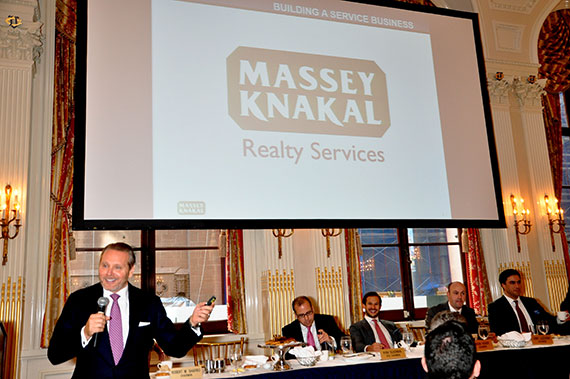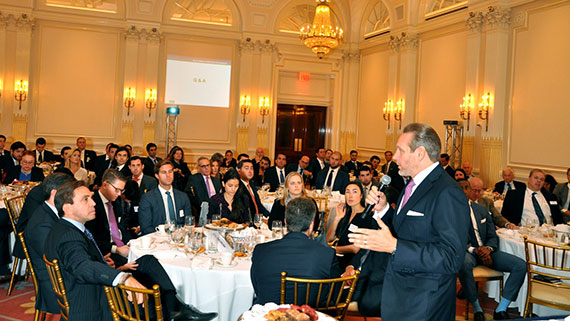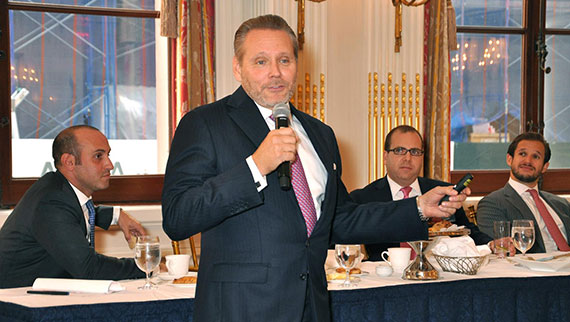Do you know your credit score? That’s not a pitch for FreeCreditReport.com, but a bit of wisdom from one of the industry’s veteran brokers.
“Without credit cards, [Massey Knakal Realty Services] would’ve been out of business in ’90,” Bob Knakal explained as he shared some of the lessons he learned running a brokerage for 26 years with industry players at the Young Men’s and Women’s Real Estate Association at its monthly luncheon Tuesday.
Just a few years after he and partner Paul Massey founded the company in 1988, they found themselves in the midst of the savings and loan crisis in 1990 with no deals under contract, and overhead costs of about $15,000 a month.
“We just had $15,000 in the bank and we looked to each other and said, ‘What the heck do we do now?’” recalled Knakal [TRDataCustom], who is the chair of New York investment sales at Cushman & Wakefield.
Their options, he said, were to pay their expenses for one month and pray things turned around, or pay off $5,000 of their most important bills for three months and see if they could get by.
“What we discovered was that we both had really good credit. So we went around to every bank in town and we got a $2,000 credit card at this bank and a $4,000 credit card at that bank.”
Between the two of them, they were able to scrape together $60,000 in credit they could borrow against, and that’s what kept the young business afloat through the rest of the year.
“The lesson there, always maintain good credit,” said Knakal, who had 25 other lessons for the audience on how to make it in real estate.
Some other bits of Knakal wisdom:
Lesson No. 1: Keep an open mind.
Flash back to 1981 when Knakal was a freshman at the Wharton School.
“I wanted to be a Wall Street guy, just like every other Wharton kid back then,” he said. During his spring break, Knakal drove around Northern New Jersey trying to get summer jobs that would look good on his resume, stopping at every commercial bank he could find.
While walking out of a Paine Webber office in Hackensack, he spotted a Coldwell Banker across the hall.
“So I look at this sign and I think this is a bank,” he said. It was only after he got an offer to interview that he headed to the library to do some research on the company.
“Don’t forget, this is 1981 so there’s no internet,” Knakal said, smiling as he recounted his initial reaction. “I see this place is a real estate company and I’m like, ‘Oh God, I don’t want to get into real estate. I took the job and I loved it from my first day on the job.”
The moral of the story? “Think outside the box,” he said, “you never know where an opportunity may be coming from.”

Bob Knakal (credit: Young Men’s and Women’s Real Estate Association)
Lesson No. 8: Always be prepared for the unexpected.
Fast forward to 1991, Knakal and Massey had maxed out their credit cards and decided they needed more help keeping afloat.
So they went to a wealthy client of theirs who happened to be on the Forbes 400 and asked for $75,000 loan. He told them he’d float them the money, but on one condition: He would get 50 percent of the company’s stock.
“This is like ‘Shark Tank’ before ‘Shark Tank’ became ‘Shark Tank,’” Knakal said.
So they went to New Jersey mortgage broker Jack Holler — who would later become Massey’s wife’s stepfather — and offered him 25 percent of the business. Holler gave the partners the loan and told them to hold onto their stock, because they’d regret it down the line. And for that, they named their salesperson of the year award after Holler.
“We walked into that client’s office knowing he was going to give us the $75, never thinking he was going to want half the business,” said Knakal. “You have to be prepared for things that you might not expect.”
Lesson No. 22: You come to work at our firm, you only have to work half a day.
“We don’t care if you work the first 12 hours of the day or the second 12 hours of the day,” Knakal quipped. “But you only have to work 12 hours of the day. You gotta work hard, but you also have to work smart.”

Bob Knakal (credit: Young Men’s and Women’s Real Estate Association)
Lesson No. 26: Be likable.
“We always told our HR department, after interviewing somebody, if you don’t feel like you want to go have lunch with them or have a beer with them, you can’t hire them,” Knakal said.
And you don’t always have to be the smartest person in the room in order to get ahead.
“If people like you, you can be a 7 or an 8 [on a scale from 1 to 10] and get business,” he explained. “You have to be good. You can’t be a 3. But if you’re a 7 or an 8 and people like you, they’re going to hire you and they’re going to work with you.”
